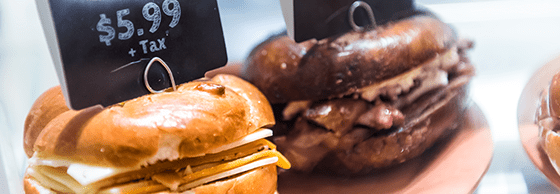Intellectual Property Insights from Fishman Stewart
Mini Article – Volume 23, Issue 8
Share on Social

Tax Loopholes and Lox: How a Cream Cheese-Stuffed Bagel Exposed a Delicious Sandwich-Tax Loophole
By Kristyn Webb
Inventors and designers have the challenging job of inventing and designing around many issues: prior art, competitive products, budgets, physics, consumer safety, market demand, supply chain hiccups, government regulations, and … taxes.
One bagel shop in New York has innovated its way around the state’s so-called sandwich tax, which adds approximately a 9% sales tax on anything that qualifies as a “sandwich.” New York’s Department of Taxation and Finance bulletin includes several suprising food items that fall into this category, like burritos, hot dogs, open-faced sandwiches, and buttered bagels. However, an unsliced and undressed bagel is not considered a “sandwich” subject to sales tax.
During Tax Season, H&H Bagels teamed up with cream cheese maker Philadelphia® to create the “Tax-Free Bagel”—an unsliced, unschmeared, H&H bagel filled with Philadelphia cream cheese. The cream cheese is injected into the bagel the way that jelly or custard is put into a filled donut. Think: stuffed-crust pizza, but with a bagel and cream cheese. Reviews have been mixed. Some consumers find the product too unconventional to be a true “New York style bagel” while others like the taste of a tax loophole.
We will see if other food establishments take similar measures to design around the tax code. Perhaps deconstructed burritos will never be a hit, but could hot dog stands start marketing hot dogs with buns sold separately?
Kristyn Webb is the Group Leader of Fishman Stewart’s Copyright Practice Group, and is currently earning a Master’s Degree in Copyright Law at King’s College London.

Published April 21, 2023


Related Content from Fishman Stewart
In a recent decision, the U.S. Court of Appeal for the Eighth Circuit affirmed a jury verdict holding that the use of the "Success Kid" meme by a congressman's reelection campaign for fundraising purposes did not qualify as fair use.
In February 2024, proposed legislation was introduced in US House of Representatives which would extend copyright protection to golf courses. The bill is titled “Bolstering Intellectual Rights against Digital Infringement Enhancement Act” or the “BIRDIE Act”.
June is Pride Month, which honors the 1969 Stonewall Uprising in Manhattan and recognizes the impact that lesbian, gay, bisexual, and transgender (LGBTQ+) individuals have had on history locally, nationally, and internationally. The United States Patent and Trademark Office flies the Pride Flag and promotes the Pride community’s contributions with programming offered annually.
June is Pride Month. This year we are celebrating with some IP tips for drag performers! Drag performers can protect their intellectual property by registering the copyrights in their original works of music, choreography, and comedy sketches.
You’re rarely more than a few yards from Finny’s favorite chips, semiconductor chips to be precise. But what exactly is a semiconductor chip?
"May the 4th Be With You," also known as Star Wars Day, takes place annually on May 4th. The phrase is a pun on the iconic Star Wars catchphrase "May the Force be with you."
First, a big “thank you” to all our readers who have given feedback on our newsletter. We appreciate your interest and insights. It is always a treat to hear from you! Second, we wanted to provide you with updates on some of our most popular articles
“Palworld”— a computer game created and published by Japanese developer Pocket Pair. Released as an early access game in January 2024, it sold over seven million copies on the computer platform Steam in the first five days and had nearly 20 million players in the first two weeks.
This year’s Super Bowl featured a thrilling overtime victory for the Kansas City Chiefs over the San Francisco 49ers. With estimates as high as 123 million viewers, America's premier sporting event also serves as a grand stage for creativity and intellectual property protections that enhance the game’s success.
Valentine’s Day is just around the corner and jewelry sales are usually around $6 billion USD in the United States alone. In 2021, the US Customs and Border Protection agency seized over $1 billion USD worth of counterfeit pieces of jewelry.
IDENTIFYING, SECURING AND ADVANCING CREATIVITY®











